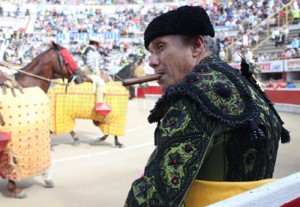The End of an Era…

He is a man from another era, another place, another reality. If parallel universes exist, Rodolfo Rodriguez—his street name—and his professional alter ego, “El Pana” is—are?—one of the strongest pieces of evidence in favor. “Pana,” as he is called by those who want to endear themselves, performed in his last corrida in Tijuana on Sunday, and although the actual results were something less than spectacular, nostalgia for the intensely talented, deeply flawed, idiosyncratic and iconoclastic artist and human rendered objective judgments irrelevant. For better and for worse, the likes of “Pana” we will never see again.
The elder statesman of Mexican toreo kept himself out of harm’s way with the first bull of the afternoon, a large, comfortably armed animal that more or less fit the morphology for “toro bravo,” and who, like his 5 brothers from the famous “Begona” ranch, was a willing, if somewhat tedious partner for their respective matadors. “Pana” offered only a picturesque remate—finishing pass—with the cape to the distracted “Nieto Querido,” and not much more with the small, red muleta. A series of low, right handed passes—derechazos—offered a diluted reference to the great stylist of his early years, but nothing was sustained and the entire effort nearly ended in disaster as the matador required 3 half-hearted attempts with the regular sword and two coup-de-grace (descabellos) blows before the animal expired.
“Cisne Blanco” (White Swan—an entire book could be entertained on the subject of the naming of Mexican brave stock), run in 4th place, was a somewhat more willing adversary, which Pana again challenged almost exclusively from the right side. Three series of truly excellent derechazos inspired the crowd, and “Cisne Blanco” grew as the faena progressed, finished with several high passes known as “San Juaneras,” the invention of “Pana’s” taurine godfather, Luis Procuna. A very lucky full sword thrust ended the life of “Cisne Blanco” and garnered two generous ears, at least one of which could be viewed as atonement for the aficion’s general indifference to Pana’s quirky early magnificence.
Uriel Moreno, “El Zapata” is, as his unique nom de guerre might imply, a torero for the working man; Joe Plumber in a suit of lights. Long among the most active toreros in Mexico, “Zapata,” like his fellow Tlaxcalan “Zotoluco”, has thrived in the nearly twenty year drought of true figuras through his extreme professionalism, his considerable athletic ability, and his dedication to giving the paying public its money’s worth, in whatever way possible. Sunday’s performance was vintage Zapata. Moreno ably covered all phases of the lidia with both “Bolshoi” and “Imperial,” refusing to accept the weakness of the first and indifference of the second as excuses in his quest for success. Banderilla placements to both animals were exciting—if not technically flawless—and his work with the muleta displayed his great technique and professional integrity in equal measure. Efficient sword thrusts earned him an ear from each animal, and the generalized contentment of the public.
Joselito Adame finally, is beginning to enjoy the fruits of the promise so clearly demonstrated in his years as a novillero—apprentice torero—and young matador. For a time following his graduation to full matador, Mexican empresarios were strangely reluctant to contract him, in spite of resounding triumphs in Spain, France and South American, where he competed with the likes of El Juli, Jose Tomas and Cesar Rincon. His work with “Sueño Cumplido” and, especially, “Ilusion” on Sunday, put the toreo of one of the most promising Mexican toreros of the new millennium on full display.
Like “Zapata,” Adame covers all 3 acts of the lidia, although his work with the cape and muleta are more profound than Moreno’s. On Sunday, he placed several fine pairs of banderillas, narrowly missing a cornada—goring, when he slipped in front of “Sueno Cumplido,” and his work with the red cloth was intelligent and correct to an animal that finished many “attacks” looking for friends in the stands. “Ilusion” — the last bull of the afternoon, and a far superior animal (not, however, worthy of the indulto — pardon, that some in the crowd lobbied for toward the end of the faena) — offered a increasingly “profound” attack, lowering his well armed head and following through cleanly to the end of each well-timed and elegantly executed pass. Adame began the faena with excellent estatuarios — “statue” passes near the boards, followed by 3 consecutive series of left handed naturales—the most difficult and revealing of all passes with the muleta.
Intermittent breezes disrupted the flow and continuity of the first series, but the second and third series were the most important and “deep” toreo of the afternoon, with Adame offering the cloth in front of his body and leading “Ilusion” through and past him, finishing with the muleta low and arm far outstretched. Two series of low right handed passes alternated with a fourth series of naturales—capped with excellent finishing touches and an exciting trio of “manoletinas,” “Ilusion” leaping high in an effort to catch Adame’s lure. The crowd—reacting to the quality of the work and the bravery of “Ilusion,” tried to get the ring judge Carazo to grant a second pardon—as he had done eight days earlier when “Zotoluco” spared the life of “Borreguero” of the La Estancia ranch. Wisely, Sr. Carazo instructed Adame to finish the animal, which Adame did—after 2 deep misses—pinchazos—and a full sword, once again proving the maxim that the most difficult thing once can do with a bull is kill it. The two ears that were his certain prize fizzled into a resounding ovation and a lap of the ring for the brave “Ilusion.”
All told, a solid follow up to the May 12th opener, and, with a bit less than ½ plaza on “championship soccer” game day, a hopeful sign of continued progress toward the full recovery of the iconic “Jewel by the Sea.”






